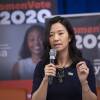It’s still not clear who will run or when the elections will be held now that Boston Mayor Marty Walsh is officially heading to Washington to become President-elect Joe Biden’s labor secretary. But a pair of new endorsements from Boston City Council Michelle Wu, the first candidate to officially enter the 2021 Boston mayor’s race, could strengthen her standing as voters start turning their focus from national to local politics.
On Saturday, Wu announced she’d received the backing of Elizabeth Warren, the U.S. senator and former presidential candidate. In a press release, Warren called the councilor “a tireless advocate for families and communities who feel unseen and unheard” and “a woman who gets out and does the work that needs to be done.”
Warren’s endorsement wasn’t a surprise, exactly. In 2009, Warren was Wu’s contracts-law professor at Harvard Law School. And in 2012, when Warren challenged then-Sen. Scott Brown, Wu served as her statewide constituency director, charged with building support in underrepresented communities. Still, it’s by far the highest-profile endorsement to date in a race that currently includes Wu and Boston City Councilor Andrea Campbell.
On Monday, Wu will be endorsed by Sunrise Movement Boston, the local arm of the Sunrise Movement, the youth-focused climate activism group.
Kendall Damon, a Sunrise Boston spokesperson, said the endorsement was driven by Wu’s attentiveness to housing, food security, public transit and climate change, as well as her conviction that these policy areas are intimately related.
“Michelle Wu is absolutely zeroing in on these issues,” Damon said. “She has put forth a bunch of really bold policy proposals that really suggest structural change to the city of Boston, with the recognition that Boston is one of the richest cities in America but that is not equitably distributed whatsoever.”
Compared to Warren’s endorsement, the value of Sunrise Boston’s backing might not be immediately obvious. According to Damon, the group has about 600 members, many of whom don’t live in Boston proper.
But Damon says that, in Sunrise Boston, Wu is getting a ready-made cadre of motivated, experienced activists ready to flex their organizational muscle for her campaign.
“City elections, whether we like it or not, [come] down to turnout, just because of the really low turnout rates for local elections, and that’s kind of what the Sunrise organizing machine is all about,” Damon said. “We campaign early, call folks, we knock on doors, and we would be mobilizing our entire hub — and potentially Sunrisers from all over America — to really help Michelle spread the word.
“Sunrise basically adds an army to Michelle’s campaign,” she added.
Wu welcomed Sunrise Boston's endorsement in an interview with GBH News.
"We need bold, urgent leadership that is grounded in community," Wu said. “Sunrise has been, locally and nationally, leading the way towards the vision that we are holding up, of racial and economic justice, and centering our communities and the people most impacted in these crises,” Wu said.
Last year, Sunrise Boston backed Sen. Ed Markey, who co-authored the Green New Deal climate plan with Rep. Alexandria Ocasio-Cortez, D-N.Y., in his Democratic primary contest with then-Rep. Joe Kennedy.
Damon, who became active in Sunrise Boston during that campaign, cites her own experience as a case study in the group’s effectiveness.
“I heard about Sunrise and the Ed Markey campaign early in the summer because of their complete blast on social media — Instagram, TikTok, Twitter,” she said. “Then I signed up for a phone bank. I joined the phone bank. And the passion is so palpable with Sunrise, when we have candidates like Ed Markey and Michelle Wu who we know can be our allies … and as a result, It really just loops you in.”
Wu was previously endorsed by Jay Gonzalez, the former Democratic candidate for governor. Campbell has been endorsed by former Suffolk County Sheriff Andrea Cabral.
It’s still not clear when Walsh plans to officially step down as mayor. If he leaves before March 5, Boston’s city charter would require a special election to fill Walsh’s post, preceded by a preliminary election if more than two candidates seek the job. The preliminary and final special elections would likely occur in May and June, respectively.
The winner would then face another election cycle this fall, with a final election in November and — if the field has three or more candidates — a preliminary election in September. However, Boston City Councilor Ricardo Arroyo has suggested waiving the requirement for a special election, a move that would require the approval of the state legislature.
Now that Walsh has announced he’s heading to Washington, several other politicians may enter the mayoral fray, including Boston City Council President Kim Janey; state Sen. Nick Collins; at-large Boston City Councilor Annissa Essabi George and state Rep. Jon Santiago.
Janey, who's in line to become acting mayor when Walsh exits, would be the first woman and first person of color to run the city.








